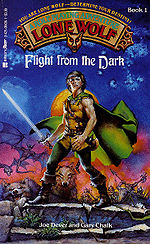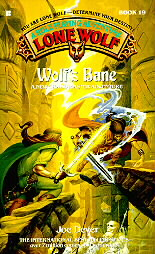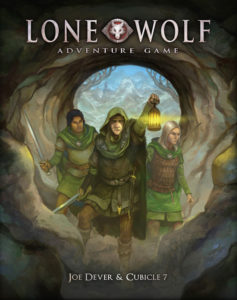
 When I was growing up, I was a voracious reader. I would like to claim that I still am, but I just don’t have the time for it like I used to. I still love reading, but my “to-read” list has grown so long over the last few years that it gets harder and harder to gain ground. One of the genres I found and fell absolutely in love with were adventure game books – specifically the Lone Wolf books by Joe Dever. These kinds of books delivered a roleplaying lite experience that was hard to match with traditional sword and sorcery fantasy or even other Choose Your Own Adventure titles and helped nurture my love for tabletop role playing when I wasn’t yet able to play myself.
When I was growing up, I was a voracious reader. I would like to claim that I still am, but I just don’t have the time for it like I used to. I still love reading, but my “to-read” list has grown so long over the last few years that it gets harder and harder to gain ground. One of the genres I found and fell absolutely in love with were adventure game books – specifically the Lone Wolf books by Joe Dever. These kinds of books delivered a roleplaying lite experience that was hard to match with traditional sword and sorcery fantasy or even other Choose Your Own Adventure titles and helped nurture my love for tabletop role playing when I wasn’t yet able to play myself.
This line of books had you enter into the magical fantasy land of Magnamund, a land as strange and wonderful as it was brutal and terrible. You played the title character, Lone Wolf, who through a dark and tragic twist of fate becomes the last of the Kai Lords, an order of warrior-monks that defended the kingdom of Sommerlund against the evil forces of the Darklords of the West. The books took the hero through a journey to avenge his fallen comrades and save the realm from the Darklords that spanned multiple books and spawned several sister series. Each book saw the title hero grow in power and skill, learning new and more powerful abilities that would come in useful during his adventures. Unlike more traditional Choose Your Own Adventure books that simply allowed you to make various choices to get through the story, these game books included an element of randomness in their design, and because of this, offered more than a fair bit of replayability.
The series was originally planned to span 32 books, though only 28 were published. The first five books are collectively known as the Kai Series, and involves Lone Wolf rallying the forces of light to repel an invasion by the Dark Lords, and ends with him recovering the Book of Magnakai. Books 6 through 12 are collectively known as the Magnakai Series, and involve the fledgling Magnakai Lone Wolf learning to utilize his new powers and ends with him destroying the Darklords in their city of Helgedad, finally casting them down. Books 13 through 20 are the Grandmaster Series and see Lone Wolf rebuilding the Kai Order. Finally, books 21 through 28 are the New Order series, featuring a new protagonist, a student of Lone Wolf and Grandmaster in his own right on their own journey. And, after many, many publishing mishaps, Joe Dever recently announced that he would publish the remaining four books on his own, and book 29 was released just this year, 18 years after book 28 was published.
The first book in the series had you choose five of ten special Kai Disciplines. These metaphysical disciplines ranged from things like a Sixth Sense that would help protect your from danger by warning you ahead of time, Weaponskill which gave you preternatural skill with a certain weapon type, and Hunting which allowed you to find food in the wilderness (almost) no matter where you were. There were also the more traditionally fantastic skills such as Mind of Matter which gave you minor telekinetic powers and the telepathic combat powers of Mindblast and Mindshield that allowed you to attack an enemy with powerful psychic attacks while protecting yourself from the same. Each Discipline had its chance to be useful at various places in the books, and your starting decisions saw you unable to advance down various paths as you adventured – if you didn’t take a Discipline, you couldn’t use it when it came up in play. Each book in the series saw you grow in power and master another Discipline, growing in power until you eventually unlocked the power of the Magnakai, and were eligible to start learning the more powerful versions of the basic Disciplines. The powers grew more and more powerful as you advanced through the books, making you feel cooler and cooler with each new one you learned.
 The books also included combat. At the beginning of the first book, you chose a random number between 0 and 9 and added 10 to the result. That determined your Combat Skill. You chose another random number between 0 and 9 and added 20 to the result to get your Endurance Points total. When combat occurred in the books, you compared your Combat Skill to your opponent’s to determine the “combat ratio,” which determined which section of the combat table you referenced each round of combat. Then you chose random numbers, which showed how much damage you took that round versus how much damage you dealt your opponent. You continued to fight until one of you reached 0 Endurance Points. Some fights included the ability to escape after several rounds of combat or had other elements to them, but there was also plenty of the traditional “fight to the death” combat that happened. The bigger the difference in Combat Ratio, the more one-sided the combats were. You could even instantly slay opponents outright if the difference was high enough.
The books also included combat. At the beginning of the first book, you chose a random number between 0 and 9 and added 10 to the result. That determined your Combat Skill. You chose another random number between 0 and 9 and added 20 to the result to get your Endurance Points total. When combat occurred in the books, you compared your Combat Skill to your opponent’s to determine the “combat ratio,” which determined which section of the combat table you referenced each round of combat. Then you chose random numbers, which showed how much damage you took that round versus how much damage you dealt your opponent. You continued to fight until one of you reached 0 Endurance Points. Some fights included the ability to escape after several rounds of combat or had other elements to them, but there was also plenty of the traditional “fight to the death” combat that happened. The bigger the difference in Combat Ratio, the more one-sided the combats were. You could even instantly slay opponents outright if the difference was high enough.
The books included a “Random Number Generator” at the back – a table of small squares that contained the numbers 0 through 9. When you needed to generate a number you, you were instructed to close your eyes and then hover your finger or pencil over the table at to generate your number. Of course, as I found out later in life, you could achieve the same effect and simply use a d10. Random number generation also played a key role in many sections of the book – where a player character might make a skill check in an adventure, you choose a random number the result of which determined which way the story went.
There were opportunities and Disciplines that helped to heal damage you took through the adventure and equipment and skills that increased your Combat Skill to help you fight off harder and harder opponents as you advanced through the books. Some equipment was important to the story, and some was simply useless objects that ended up eating up space in your inventory if you weren’t careful with what you picked up. There was any number of different ways to make your way to the end of the book. And there were many more ways to fail your quest – from falling in combat to making a poor choice, to simply poor luck in your random number generation.
I can’t tell you how many times I played through these books growing up. I never did manage to get the later books in the series – most of them were already long out of print by the time I started to discover them, but those that I did were well loved and well-played. Several years ago, I discovered Project Aon – this project had taken the game books and updated them for use in a browser, allowing you to play through them online. Joe Dever himself had given the project his blessing and go ahead to distribute this content for free online. It was really cool to see something that I had loved growing up still alive after years of being out of print. Here was a series of books that had fans so devoted they spent the time and effort to update it for play in the modern day, and even cooler to see it being embraced by the original creator.
A few years after that, I discovered the motherlode while browsing through the Google Play store. I found an app called Lone Wolf Saga that took the hyperlinked text that Project Aon built and built a more extensive framework around it that allowed you to play through the game on your Android device (sorry Apple fans, for once here’s something I get to brag about having access to), complete with automatic, real time inventory tracking, random number generation, combat skill and endurance point tracking and player profiles that tracked your progress as you advanced through the various books. The creator releases the books as he gets them converted for free, relying on the donations of the app’s users to fund his efforts.
I recently picked the app up again and started up a new character to reclaim some of the wonder of my youth without having to delve into the pits of Amazon to try to find all 28 of the game books in reasonable shape for reasonable prices. And I’ve been enjoying the hell out of my return to Magnamund. But damn, I must have cheated more than I care to admit when I was younger – I never remember these books being as brutal as they are. In playing through the first book against last night I died no less than a dozen times.* There are few defeats more complete than nearing the end of the book only to flub a random number check and fall into a crevasse at full health and die, and it’s irritating to lose all of your progress because of that bad number or because you were outclassed by a monster that killed you if you took any damage (I’m looking at you Caverns of Kalte), but I’ll be damned if they don’t still hold up as a fun play experience today.
 You can discover the books for yourself, along with news about all things Lone Wolf at Project Aon, or if you have an Android device, you can find the Lone Wolf Saga App on the Play Store. Or, if you would like to experience the setting of the game books with your regular gaming group, Cubicle 7 released the Lone Wolf Adventure Game in 2015 for your game night pleasures. If the d20 system is more your speed (and assuming you can still find copies), Mongoose Publishing released a tabletop version of the game using the OGL back in 2004. I have not had the pleasure of playing the newest game from Cubicle 7 yet, but from the sounds of it, they did a wonderful job of capturing the feel of the books with this release. Written by Joe Dever himself, it looks to be something that is going to jump directly to the top of my list. Now if you’ll excuse me, I’ve got a world to go and save… right after I start this book again. I swear they weren’t this difficult when I was younger.
You can discover the books for yourself, along with news about all things Lone Wolf at Project Aon, or if you have an Android device, you can find the Lone Wolf Saga App on the Play Store. Or, if you would like to experience the setting of the game books with your regular gaming group, Cubicle 7 released the Lone Wolf Adventure Game in 2015 for your game night pleasures. If the d20 system is more your speed (and assuming you can still find copies), Mongoose Publishing released a tabletop version of the game using the OGL back in 2004. I have not had the pleasure of playing the newest game from Cubicle 7 yet, but from the sounds of it, they did a wonderful job of capturing the feel of the books with this release. Written by Joe Dever himself, it looks to be something that is going to jump directly to the top of my list. Now if you’ll excuse me, I’ve got a world to go and save… right after I start this book again. I swear they weren’t this difficult when I was younger.
*N.B. The author has deliberately low-balled this estimate in an effort to save face. It was easily closer to two dozen, several by accidentally choosing the same path multiple times.
